Positive effects
Dr. Nguyen Phong Tan - Vice Principal of Hanoi College of Industry and Trade, emphasized that when applying digital transformation, learners can access digital learning materials, online lectures (E-learning) and open resource stores anytime, anywhere, increasing flexibility and lifelong learning opportunities; using virtual reality/augmented reality (VR/AR) and simulation technology helps learners practice their profession more vividly, safely and effectively.
“The school is applying digital transformation throughout the unit and gradually making English the second language in the school. Building a digital training management system, digitizing records, learning materials, and lesson plans helps make management more streamlined, transparent, and effective. Building a digital school brand, contributing to international integration and becoming a center for training high-quality human resources in the capital,” Dr. Nguyen Phong Tan added.
Ms. Nguyen Thi Lien - Director of Dan Phuong Vocational Education and Continuing Education Center, said: Realizing the importance of digital transformation, the center has invested in information technology infrastructure, Internet connection, and upgraded computer systems. This not only serves administrative management, but also creates conditions for teachers and students to easily access digital learning tools.
Right from the first days of the school year, the center disseminated and thoroughly grasped the Party and State's guidelines, policies and laws to cadres, teachers, staff and students on digital transformation, including this content in the unit's annual programs and activity plans.
Innovate and diversify the content, forms, and methods of dissemination, propaganda, and education to raise awareness among cadres, party members, teachers, staff, and students about the benefits, challenges, opportunities, and urgency of digital transformation. Implement supervision and strengthen inspection and examination work in vocational education and digital transformation, ensuring democracy, publicity, and transparency.
In addition, pay attention to developing digital capacity for vocational education teachers, complete data updates and authentication, synchronize personal identification numbers, apply adaptive learning methods, harmoniously combine direct teaching and learning at school with the use of technology, digital learning materials, real devices, virtual devices, virtual classrooms...
Thanks to the effectiveness of digital transformation, the center's teachers have designed multimedia lectures, integrating technology into teaching. In the coming time, the teaching staff will continue to focus on building electronic lesson plans, using projectors in teaching, to create appeal, many perspectives, and access to multi-dimensional knowledge for learners.
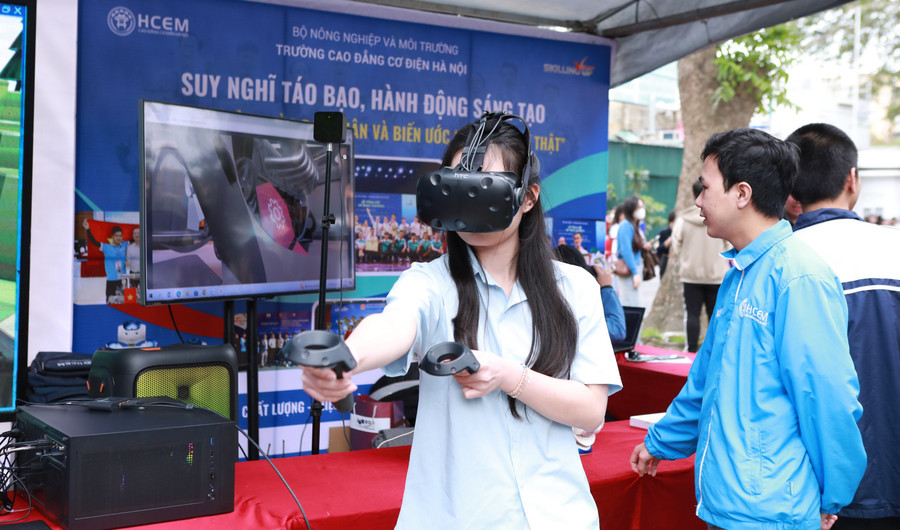
Accelerating digital transformation
As an officer in charge of digital transformation at Hanoi College of Electronics and Refrigeration, Mr. Le Viet Cuong shared that the application of AI in vocational education not only helps improve the quality of teaching and learning, but also contributes to forming a cooperative ecosystem between schools - businesses - experts, aiming to develop digital capacity and adaptive skills for staff, lecturers and students.
“We are applying AI technology to training programs on subjects of object recognition and behavior detection. For AI to truly become an effective tool to support vocational education development, it is necessary to develop open AI tools and learning materials that schools can access, customize and deploy according to their conditions; support investment in digital infrastructure, including network systems, simulation equipment and career data centers,” said Mr. Cuong.
Mr. Pham Xuan Khanh - Principal of Hanoi College of Technology, informed: In recent times, the school has promoted the application of technology, digital transformation, technological and digital innovation, promoted creativity, and at the same time pioneered in designing and transferring new teaching programs.
The school regularly organizes activities to improve foreign language, digital technology and professional skills for staff and lecturers. Many lecturers have actively applied artificial intelligence and modern technology in training.
In particular, the Hanoi People's Committee assigned Hanoi College of High Technology to participate in supporting the "45 Days and Nights" Campaign to promote digital transformation activities in communes and wards in the initial phase of operating the two-level local government model.
Within the framework of this mission, the school sent students to localities to support digital transformation work for the government and schools, clearly demonstrating the school's capacity, responsibility and pioneering role in the digital transformation process.
Ms. Dao Thi Thu Huong - Head of Foreign Language Department, FPT Polytechnic College said that currently 100% of students have studied and taken exams online, using testing and evaluation software completely on online platforms, strongly applying information technology and AI in exams.
In applying AI in foreign language teaching, it is necessary to promote all four skills of listening, speaking, reading and writing for students. Lecturers and students are taking advantage of free software to interact directly with AI, practice listening and speaking. The important thing is that students practice language reflexes and overcome psychological barriers to communication.
According to Ms. Huong, vocational colleges currently train students for the international labor market, so "training listening and speaking skills is a vital factor". In addition, applying AI also helps students analyze texts, explain vocabulary, sentence structure... much more conveniently.
Ms. Huong expressed her wish that the education sector organize more competitions and foreign language exchange playgrounds between vocational schools, so that students have the opportunity to practice in practice. Even ordinary workers such as assembly workers, car repairmen, taxi drivers... should be given the opportunity to speak English at a basic level. Only then can the quality of Vietnamese human resources be improved.
Identify the challenges
Meanwhile, Mr. Nguyen Van Toan - Director of Son Tay Vocational Education and Continuing Education Center, said: Although the center is fully aware of the role of digital transformation in teaching and learning foreign languages, it still faces many practical difficulties. The unit currently has only 26 staff members and must sign contracts for 64 more teachers; facilities have been invested but lack modern teaching equipment.
“Digital transformation requires a good technology platform, but we lack both human resources and financial resources. Even purchasing management software and online learning is difficult because the budget is not guaranteed. Therefore, Mr. Toan proposed that vocational education and continuing education centers be given increased funding, training, and improvement of the qualifications of the teaching staff.
According to Mr. Nguyen Thanh Hung - former Deputy Director of the Department of International Relations under the Government Office, the application of AI technology in vocational education development in our country brings many benefits. However, the lack of synchronous facilities, especially in rural and remote areas, can limit the application of technologies such as AI and virtual reality; training programs for lecturers and management staff on AI are still limited, and the capacity to apply technology is still a bottleneck that needs to be removed.
“Vocational education is characterized by its strong practical and direct skills - while AI is often associated with digital learning and simulation. Integrating without losing the practical element is a big challenge for vocational education institutions. Therefore, it is necessary to change training methods, program content and assessment to suit the AI-supported environment. Measuring the effectiveness of AI application in vocational training is not clear, so more research time is needed,” Mr. Hung emphasized.
According to Mr. Tran The Cuong - Director of the Hanoi Department of Education and Training, the city currently has 29 vocational education and continuing education centers. In the context of digital transformation being an inevitable trend, popularizing digital knowledge and foreign language skills plays a key role in narrowing the digital gap and enhancing national competitiveness.
Implementing the Project to make English the second language in schools, Hanoi currently lacks about 1,000 English teachers from kindergarten to high school. Some vocational colleges have implemented bilingual programs according to business orders, but still face limitations such as lack of qualified teachers, lack of practice environment, uneven level of learners, so the effectiveness is not high.
The Director of the Hanoi Department of Education and Training added that in the coming time, the capital's education sector will focus on solving infrastructure difficulties, improving the capacity of teachers; at the same time, building a system of digital classrooms and digital schools to make teaching in foreign languages more effective, contributing to improving the quality of teaching and learning for learners.
Source: https://giaoducthoidai.vn/truong-nghe-day-manh-so-hoa-dao-tao-post756471.html




![[Photo] Unique art of painting Tuong masks](https://vphoto.vietnam.vn/thumb/1200x675/vietnam/resource/IMAGE/2025/11/14/1763094089301_ndo_br_1-jpg.webp)

![[Photo] Deep sea sand deposits, ancient wooden ship An Bang faces the risk of being buried again](https://vphoto.vietnam.vn/thumb/1200x675/vietnam/resource/IMAGE/2025/11/13/1763033175715_ndo_br_thuyen-1-jpg.webp)
![[Photo] Special class in Tra Linh](https://vphoto.vietnam.vn/thumb/1200x675/vietnam/resource/IMAGE/2025/11/14/1763078485441_ndo_br_lop-hoc-7-jpg.webp)
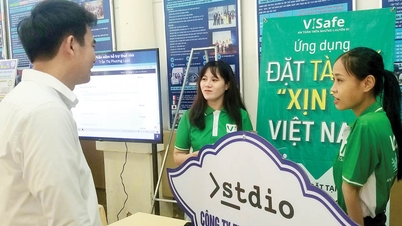

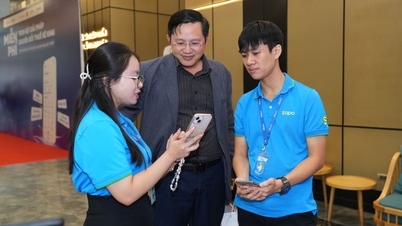

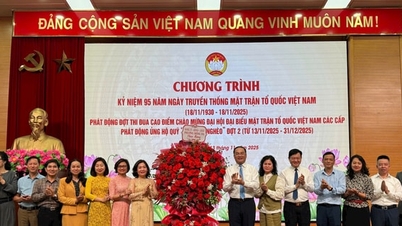

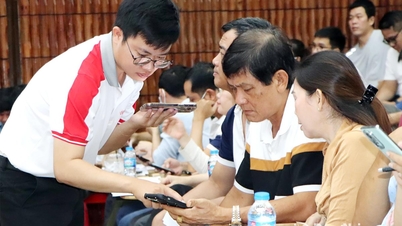


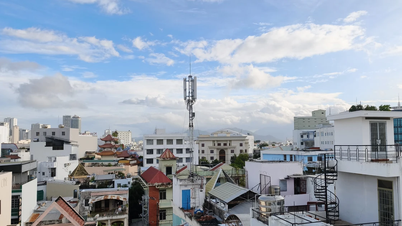

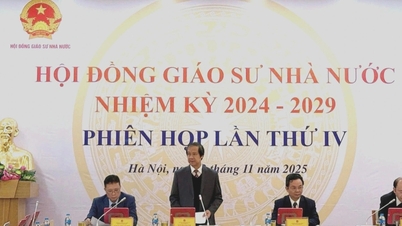

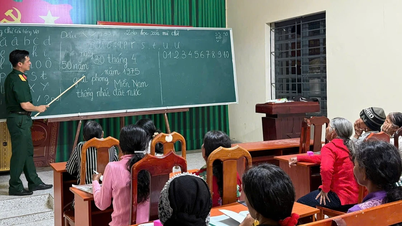
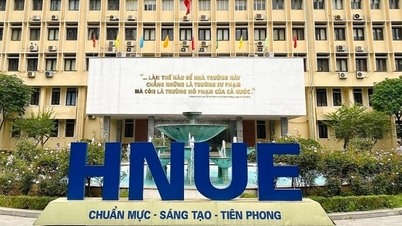




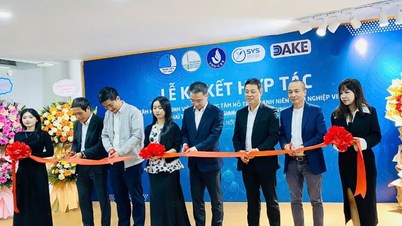





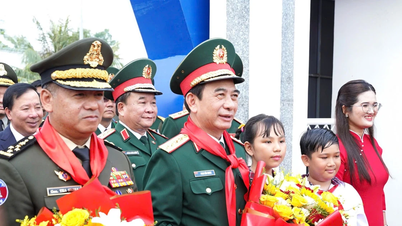
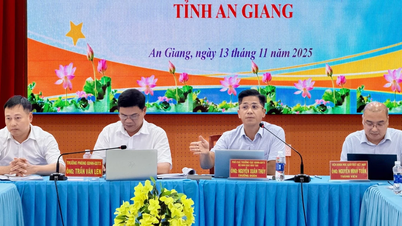
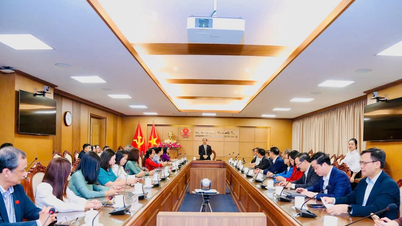
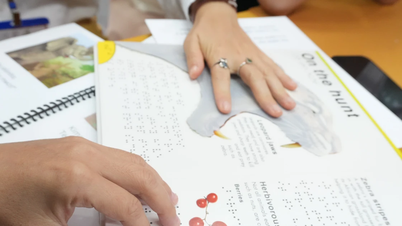
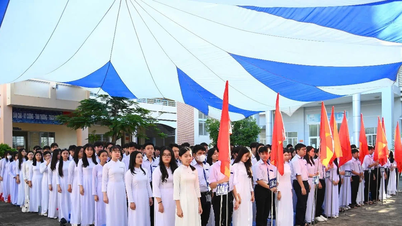










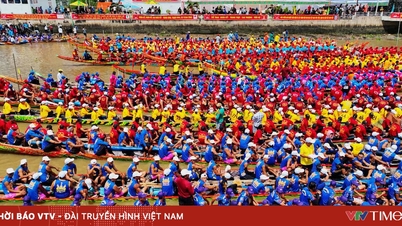





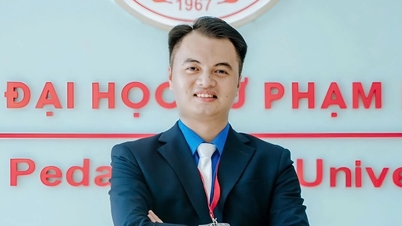




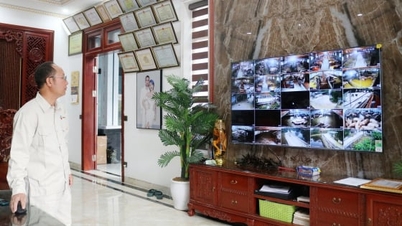























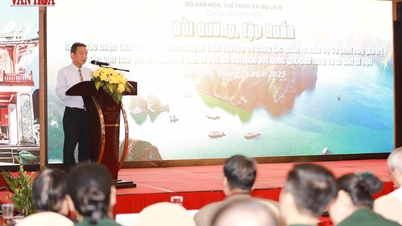


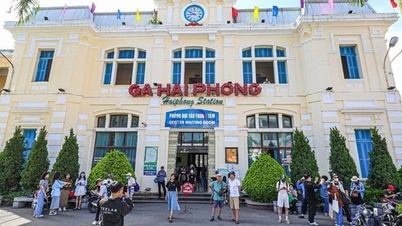



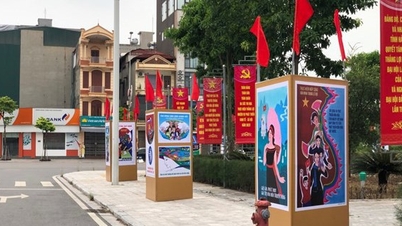
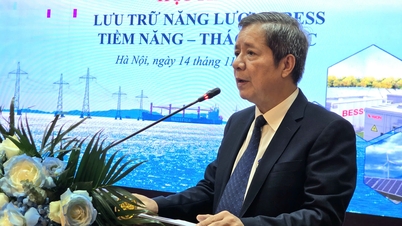
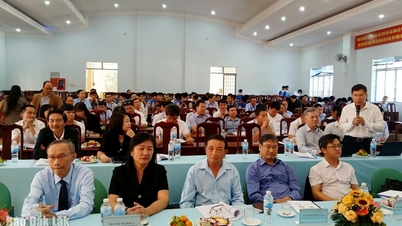

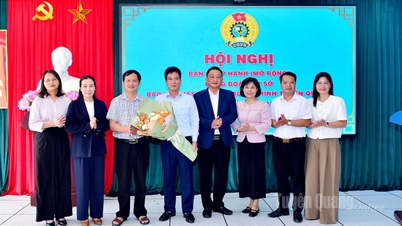

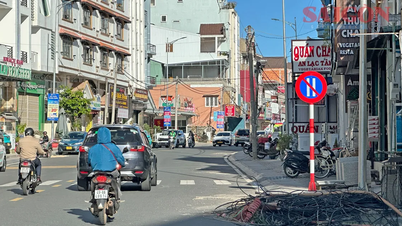
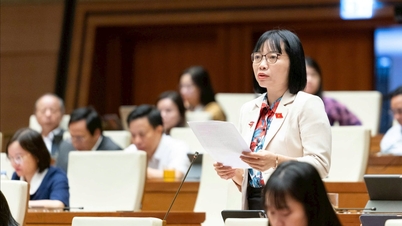

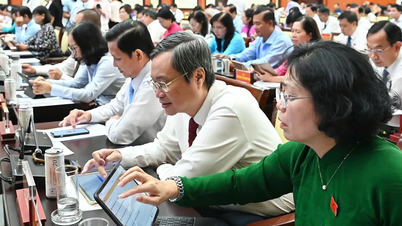
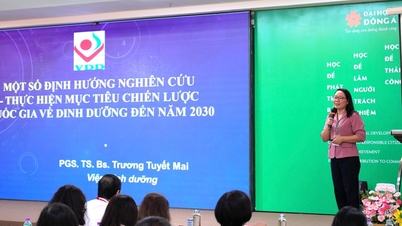





![Dong Nai OCOP transition: [Article 3] Linking tourism with OCOP product consumption](https://vphoto.vietnam.vn/thumb/402x226/vietnam/resource/IMAGE/2025/11/10/1762739199309_1324-2740-7_n-162543_981.jpeg)






Comment (0)